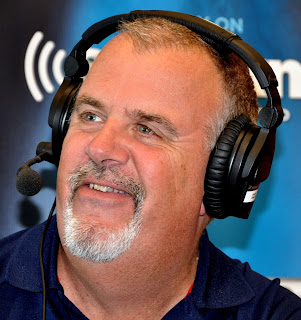
Barney Visser is an American
success story.
Fresh out of High School in
the late 1960s, the Colorado native volunteered to serve in the Vietnam
War, spending 21 months as a paratrooper in the 173rd Airborne Brigade. After
being discharged, he briefly attended the University of Northern Colorado before
losing his GI scholarship and going into business manufacturing pillows in the
1970s.
His “Pillow Kingdom” expanded
to eight stores by 1977, giving birth to a “Big Sur Waterbeds” brand that expanded
into an 85-store franchise by the mid-1980s. Waterbeds soon led to conventional
mattresses and furniture, and Visser’s Furniture Row and Denver Mattress
companies now operate more than 330 stores in 31 states.
Visser took a similarly
nonconformist approach to motorsports, racing at Colorado
National Speedway before forming a NASCAR team with local modified driver Jerry
Robertson in 2005.
A self-funded, single-car team
owner based far from NASCAR’s North Carolina epicenter, Visser was given little
chance of success when he arrived on the scene. With Robertson at the wheel,
Visser struggled to gain traction at the sport’s highest level, making just 11
combined starts in what are now the NASCAR Xfinity and Monster Energy Cup
Series, with a best finish of 22nd.
Despite their competitive struggles,
Visser continued to prop up the team with millions of dollars of his own money
each season. Robertson, Kenny Wallace, Jimmy Spencer and Joe Nemechek all spent
time behind the wheel in FRR’s first three seasons, without a single Top-10
finish to their credit. Youngster Regan Smith experienced similar struggles in
2009 and 2010, before the team finally broke through with an upset victory in
the legendary Bojangles Southern 500
at Darlington Raceway in 2011.
Since then, Furniture Row has added
17 more MENCS victories – all by Truex – in addition to qualifying for the
postseason playoffs five times, with Kurt Busch (2013) and Truex. They reached
their peak last season, with a series-high eight wins and a
championship-clinching win by Truex at Homestead Miami Speedway last November.
Teammate Erik Jones claimed MENCS Rookie of the Year honors, capping a season Visser
compared to “climbing Mount Everest.”
Unfortunately,
while the view from the top of the world’s highest peak is unquestionably spectacular, very few climbers feel the need
to risk their lives by ascending it twice.
A
lack of sponsorship forced Visser to park Jones’ No. 77 Camry at the end of
last season, taking FRR back to its roots as a single-car entity. And when
5-hour ENERGY informed the team last month that it will not return in 2019, it
left Visser with a $10 million capital deficit to overcome, and only 60 days to
do it. Coupled with a Joe Gibbs Racing technological alliance that was
reportedly set to triple in price next season, the financial writing was on the
wall.
Visser
announced yesterday that his championship-winning team will not return in 2019,
saying, “The numbers just don’t add up.
I would have to borrow money to continue as a competitive team and I’m not
going to do that. I’ve
always felt that we could be a competitive team and run for a championship,
even when it seemed like a pipe dream to many racing insiders. To continue with
anything less than a competitive team would not be acceptable.”
Furniture
Row Racing authored NASCAR’s ultimate Cinderella story last season, overcoming insurmountable
odds to become champions on the sport’s grandest stage. But without regular infusions
of life-saving capital, Cinderella’s coach must ultimately change back into a pumpkin.
A sport
whose business model requires a sponsor to spend far more than perceived market
value (or an owner willing to invest tens of millions of his own dollars annually)
is ultimately doomed to failure. The cost of climbing NASCAR’s version of Mount
Everest is approximately $30 million per year, and while the U.S. and world
economies have each begun to show signs of a rebound in the last 12 months, not
enough corporations consider the view from the top to be worth the price of the
climb.
Two
decades ago, most major NASCAR teams operated with a single, full-season
sponsor. Today, very few teams enjoy that luxury, forced instead to secure
multiple, smaller backers to underwrite their whopping, $30 million annual price
tag.
“I had a wake-up call last
year,” said Visser, who missed Truex’s 2017 championship celebration while
recovering from heart bypass surgery. “And while I feel great, I need to make
the best decisions that will have an impact on myself and my family.”
For Truex, Visser’s decision has an
all-too-familiar feel. The New Jersey native joined Furniture Row in 2014 when NAPA Auto Parts departed
Michael Waltrip Racing in the aftermath of a late-season cheating scandal,
leaving him without a ride. FRR was Truex’s only option to continue as a MENCS
driver, and he thanked Visser this week for saving him from the scrap heap,
saying Furniture Row “…took me in while my career was in a bad place.”
The timing of yesterday’s
announcement could not be worse. Truex and crew chief Cole Pearn must now find
new homes for 2019 and beyond – likely at Joe Gibbs Racing – while simultaneously
being embroiled in the heat of a late-season playoff chase.
“Make no mistake, this is not the
immediate end,” said Truex yesterday. “We still have unfinished business to
attend to, and that’s to give everything we have to successfully defend our championship.”
Visser deserves nothing less, and
NASCAR owes it to him to learn from his example.
Very
few owners are devoted (or crazy) enough to do what Visser has done over the
years, funneling their personal fortunes into the pursuit of a checkered flag. Very
few allow themselves to be guided by their hearts, rather than their
heads.
And
with the departure of Barney Visser at season’s end, there will be one fewer
still.
One less
glorious lunatic to pour his heart and soul into a sport that seems to give
less and less in return.














